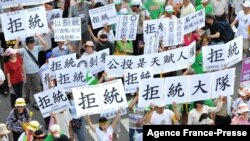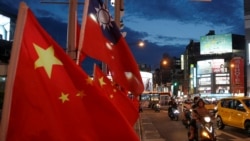Experts say China is ramping up its push for unification with Taiwan by promoting the potential economic benefits, advantages most Taiwanese are unwilling to accept in exchange for their democracy.
China's campaign began when the Beijing-backed newspaper CPPCC Daily published an article titled "Taiwan's Future Lies in Reunification," which contended that reuniting with mainland China would benefit average Taiwanese citizens financially.
Beijing considers Taiwan a breakaway province that someday will be reunified with the mainland. Since 1949, when the Chinese Communist Party took control of China, Taiwan has considered itself a self-governing sovereign state.
The article said reunification would save military and "money diplomacy" expenses amounting to an extra $722 per year for each Taiwanese citizen. Annual per capita income in Taiwan is close to $28,900 in 2021, compared with $11,890 in China.
Published on November 20, the article took off as other news outlets reposted it. Some Chinese netizens lauded Beijing's generosity: "Where can you find such great government and policies? Taiwan should come back to the motherland immediately." Some skeptics, however, wondered where the proposed benefits for Taiwan would come from: "Are they going to get an increase in income from our [mainland citizens] tax revenue?"
In Taiwan's largest online discussion forum, PTT, one of negative commenter wrote, "Look at how the Chinese Communist Party promised Hong Kong, and look at Hong Kong now!" And another wrote, "No freedom to speak freely and no freedom to criticize Xi Jinping? No thank you!"
Sung Kuo-Chen, a researcher at the Institute of International Relations at National Chengchi University in Taiwan, told VOA Mandarin he believed most Taiwanese would not forgo their democracy for cash.
"I don't think the proposal touches Taiwanese at all. When hearing this, most people feel it's a ridiculous idea," he said in a phone interview. "The offer from China reflects the Communist Party's materialist view. They don't understand how much Taiwanese people value their freedom, human rights and their sense of spiritual happiness."
Beijing's propaganda effort is playing out against a flurry of incursions into Taiwan's air defense identification zone, the most recent on Sunday.
China's campaign even includes a song, "Go to Taiwan in 2035," appearing on many social media platforms. The song extols the allure of Taiwan with lyrics such as "Let's take a high-speed train to Taiwan/ The dream will be realized in 2035/ We will enjoy the scene at Penghu Bay together/ And visit Ali Mountain and Riyuetan Lake."
But the idea of reunification has been losing popularity for years, according to Michael You, chairman of the Taiwanese Public Opinion Foundation. He told VOA Mandarin that in 1991, 45.3% of people supported cross-strait reunification, 25.3% wanted to maintain the status quo and 12.5% preferred Taiwan independence.
"And we found that the percentage of people who support unification keeps going down since the 1996 Taiwan Strait crisis," You said. "In our survey this year, only 11.1% of people want to see the two sides reunified. It's a clear downward trend."
Ni Yongjie, deputy director of the Shanghai Institute of Taiwan Studies, told VOA Mandarin via phone that reunification would result in a benefit greater than $722 (20,000 New Taiwan dollars) per year per person. He said personnel exchanges and cooperation in science and technology would produce economic benefits for Taiwan and improve living standards.
"But we can't only view this from a materialism perspective," he said. "China doesn't want to 'buy' Taiwan. I think we are looking for the highest level of integrated development — in our systems, lifestyles and values between people on both sides."
Zhu Fenglian, spokesperson for China's Taiwan Affairs Office, said at a news conference on November 24 that China was planning to develop the "Taiwan Channel" — a high-speed railway covering the 120 kilometers between China's Fujian province and Taiwan's Kinmen County and Matsu Islands — to facilitate tourism and trade across the Taiwan Strait.







